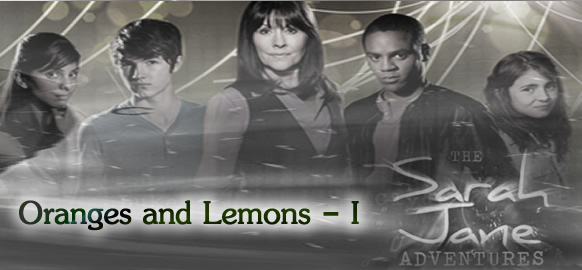
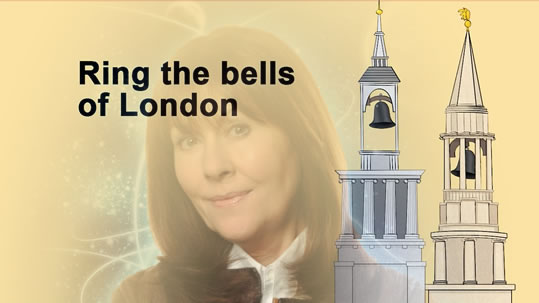
Sarah-Jane came up the attic stairs to where she used to have a private place where she kept Mr Smith the super-alien-computer and all of her souvenirs of an extraordinary but mostly secret life among aliens and mysteries.
These days it was anything but private. Luke was home from Cambridge. Doing a PhD in archaeology allowed him some holidays flexibility unlike the strictly organised terms of an undergraduate. He felt a little bereft because Pieter was in Germany, but glad to be home and in the company of Clyde and Rani.
They were all gathered in a semi-circle in front of Mr Smith, poring over some sort of letter while at the same time giving Mr Smith co-ordinates to plot on a map of what Sarah-Jane quickly recognised as London.
“Are you all learning the Knowledge?” Sarah-Jane asked them and got four blank looks. “It’s the test London taxi drivers used to have to take to prove they knew their way around the city,” she explained. “What did I spend all that money on school fees, for?”
“But we all went to a state school,” Luke pointed out. “And Clyde and Rani aren’t your kids, anyway?”
“They aren’t?” Sarah-Jane answered with mock surprise. “So how come I feed them so often and they spend more time on my computer than I do?”
Everyone looked at her with worried faces before she laughed and asked them what they were up to.
“We’re trying to work something out,” Luke explained. “From this….”
He gave Sarah-Jane the letter. It was on old, dry paper that crackled loudly. The message was written in old-fashioned cursive handwriting of the sort none of the youngsters had been taught.
It was signed by Madame Vastra.
“How did it get here?”” Sarah-Jane asked. “And… when?”
“This morning’s post,” Luke answered. “While you were out. It had two envelopes – the outer one was from a solicitor in Holborn Road. Enclosing an envelope left with them in 1922 to be delivered today according to instructions from their client.”
He showed his mother both envelopes and a short explanatory note on a complimentary slip with the solicitor’s letterhead.
Sarah-Jane read the older letter again.
“Since the earliest expansion of London into a metropolis, overcrowded and overwhelmed by ape-descendants it has been necessary to balance the lifeforce within its boundaries by the placing of ‘nodes’ in selected places. These nodes must, from time to time, be recalibrated or London will descend into mayhem….”
“Does anyone think that’s already happened?” Clyde asked. Nobody disagreed.
“More mayhem than usual, I suppose,” Sarah-Jane said. “Believe me it COULD be a worse place than it is, now.”
She went on with reading the letter.
“The nodes are incorporated into the bronze of the bells of London churches. Calibrating them is simply done by placing a magnet against the bell for three minutes exactly. You will know the correct bell by the fact that it is noticeably magnetic. Bronze is not usually so unless other metals than copper and tin are used in the founding.”
“That is perfectly true,” Luke said, knowledgeable on this and many other matters of pure science.
“The calibrations must be completed between sunrise and sunset on the Autumn equinox.” Sarah-Jane continued.
“Tomorrow,” Rani pointed out.
“Jenny and I completed the calibration in 1922. You and your young friends are the best people I know onto which to hand the burden. Your intelligence and ingenuity are almost equal to mine.”
“Modest as ever,” said Clyde who had spent a few days trapped in the past in Madame Vastra’s household. “This, by the way is where it gets a little complicated.”
“The sixteen nodes are identified in the folk song that begins – ‘Gay go up, and gay go down - To ring the bells of London town.’ The song was composed as a way of passing on the information to those fit for the task, while hiding it from the unworthy.
Good luck and my best wishes to you….”
“Aside from an old-fashioned interpretation of the word ‘gay’, we found out, with a bit of simple Googling, that the song is usually known as ‘oranges and lemons,” Luke explained.
Interestingly, none of the four youngsters really knew the song, Sarah-Jane discovered. Luke and Sky had been born AFTER the age where most children learnt playground rhymes. Clyde had precociously discovered the music called ‘Grime’ pretty much before it was even called ‘Grime’ and never bothered with nursery rhymes, while Rani had spent her childhood listening to Indian folk songs until she rebelled in her teens and started listening to Radio 1xtra. They had researched it very well, though, and had identified several problems.
“We found at least five versions of the song,” Luke explained. “Some of them had different locations mentioned. We created a composite of the different versions with sixteen couplets – sixteen churches.”
Rani asked Mr Smith to display the words. Sarah-Jane read with interest.
Bull's eyes and targets, Say the bells of St.
Margaret's.
Brickbats and tiles, Say the bells of St. Giles'.
Halfpence and farthings, Say the bells of St. Martin's.
Oranges and lemons, Say the bells of St. Clement's.
Pancakes and fritters, Say the bells of St. Peter's.
Two sticks and an apple, Say the bells at Whitechapel.
Pokers and tongs, Say the bells at St. John's.
Kettles and pans, Say the bells at St. Ann's.
Old Father Baldpate, Say the slow bells at Aldgate.
Maids in white Aprons, Say the bells of St Catherine's.
You owe me ten shillings, Say the bells of St. Helen's.
When will you pay me? Say the bells at Old Bailey.
When I grow rich, Say the bells at Shoreditch.
Pray when will that be? Say the bells of Stepney.
I'm sure I don't know, Says the great bell at Bow.
When I am Old, Ring the Bells at St. Pauls.”
“There are some contorted rhymes there,” Sarah-Jane observed. “’Be and Stepney’, ‘shillings and St. Helens’. ‘Old and Pauls’ couldn’t even qualify as assonance.”
Rani agreed with her literary criticism. The boys were less concerned.
“The biggest problem is we have an extra line that doesn’t fit,” Luke said. ”From a quite old version we found ‘When I grow rich, Say ye bells at Fleetditch. We can’t even find that on a modern map.”
Sarah-Jane smiled. Two artificially enhanced geniuses in the family and neither of them worked it out by thinking beyond modern maps. Mr Smith was slipping, too.
“Ask an old journalist,” she said. “Fleet Street, traditional home of the newspaper industry, as you ought to know, lies directly over the hidden River Fleet, which was, at one time, known as…”
“Fleet Ditch,” the youngsters chorused.
“Mr Smith, is there a church around Fleet Street,” asked Sky, but Sarah-Jane was ahead of them.
“There are several,” she said. “Including the Temple Church built by Knights Templars and featuring in The Da Vinci Code. But I would guess the poem means Saint Bride’s on Fleet Street. It was built by Sir Christopher Wren – who also, as you lot SURELY know, built St. Paul’s Cathedral, which is just around the corner from where Madame Vastra and her wife lived in Paternoster Row. ‘Pauls’ is the last location in the song.”
“But there is a good candidate at Shoreditch, too,” Clyde said. “St Leonard, Shoreditch, built by a pupil of Wren, so that also ties in.”
“Plus,” Rani added. “On their website, St Leonard’s actually claims they are the one in the rhyme.”
“There are a couple more problems,” Luke added. “St. Martins could be either of two churches. And St. Clement, surprisingly, that being a rare name even in history.”
“We can check both in all three cases,” Sarah-Jane said.
“We?” Luke asked. “You’re helping?”
“In Vastra’s day, churches were open from sunrise to sunset. These days you might have to wait for service times or charm a verger into letting you in. That will cause delays. Also, there is no sense in taking cars around those locations. The roads will be impossible. Take your Oyster Card or walk if you can. St. Mary le Bow in Cheapside is only a short walk from St Sepulchre-without-Newgate – Old Bailey. And both are pretty much in the shadow of St. Pauls. No point getting parking fines for those. I suggest two parties. I’ll take my press pass and Sky can be a work experience student with me. Rani, you do the same. Luke, you can throw your Cambridge PhD at them if she can’t charm them. And Clyde can talk art and architecture to back you up. Now, let’s look at the map and see how to divide them up for the least shoe leather. Always a good journalistic tip.”
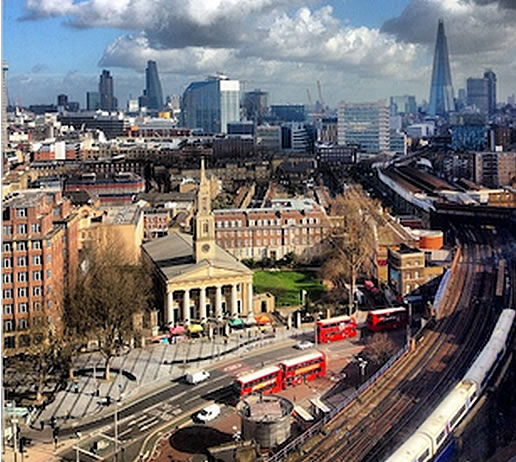
Pokers and tongs, Say the bells at St. John's.
The plan got underway after breakfast on a cold but not too windy equinox morning. Sarah-Jane and Sky headed first by three changes on the Tube, to the only one of the churches on the south side of the river. They admired the grand Victorian architecture of the station as they passed through onto Waterloo Road where their target stood directly across the busy road, obscured momentarily by three London buses.
“It’s a Waterloo Church,” Sarah-Jane said as they crossed the road and entered the church grounds by a temporary wooden gate. The church was closed for renovations. “No, I don’t mean because it’s on Waterloo Road, opposite Waterloo Starion. That came later. After the French forces were defeated in 1815, the British government extracted money in ‘reparations’. They used it to build churches all over the country. This is one of a half dozen or so in London.”
Sky looked at the Greek inspired colonnaded pediment and the slender spire above it and frowned. “It’s a nice building. But why didn’t they give the money to the soldiers coming home from the war? We did it in history – not the battle so much, but the social impact – thousands of men suddenly without jobs – a lot of them wounded or with what we now call PTSD. The money should have gone to them.”
Sarah-Jane smiled wryly. When she was at school it was all about the battles, dates and names of generals. The ‘social impact’ wasn’t mentioned.
“You’re right, of course,” she told her adopted daughter. “But they didn’t think that way, back then. They thought providing for the spiritual welfare of the population was more important. That’s one thing I learnt from The Doctor. You can’t put the moral code of your own time on the past – or on other planets and their cultures.”
“That didn’t stop you telling that soppy queen of… what was it… Peladon… to stand up for herself as a woman.”
“Did I tell you that story?” Sarah-Jane asked. “Well, she WAS soppy. But she took my advice and pulled herself together. Ah… this must be Mr Sutton.”
A sandy haired man came from a side door and approached them, smiling. He held out his hand in greeting.
“Miss Smith, it is gratifying to have such a famous journalist wanting to write about our church,” he said. He turned to Sky, still smiling. “And for the next generation to take an interest.”
Sky really didn’t know what to say. She WASN’T interested in the church as such. The amount of history Sarah-Jane had given already was enough for her. She was rather afraid Mr Sutton was going to talk a lot.
He did, but not so much about history. He was enthusiastic about the renovations that meant much of the interior was covered in tarpaulins. In between church services, the huge interior was a popular venue for concerts and the work to open up the crypt would mean that the secular and sacred would not encroach on each other.
Sky wondered if that meant concerts and church services at the same time, which would need a lot of sound-proofing and didn’t quite sound right anyway.
“But it is our bells that are important to you,” Mr Sutton reminded himself more than them. “This way. The bells are silent just now, even on Sundays, but they rang along with the other London churches in June for the Platinum Jubilee.”
He led them through a door and up a narrow, winding staircase. They passed the mechanism for the clock, then emerged onto the slightly draughty bell platform.
There were eight bells. Sky took in the fact that the largest was a ‘tenor’ bell of one tonne weight and that they were cast at the famous Whitechapel Foundry. She tuned out from the details of ‘change’ bell ringing which her mother dutifully listened to.
She reached out to touch the tenor bell, the magnet concealed in her palm.
“Mu…” She stopped herself quickly. She was meant to be a junior journalist. “Miss Smith… the bell is singing.”
Mr Sutton chuckled a little patronisingly.
“There are always vibrations – buses, trains, even aeroplanes going over. The bells respond. They are rarely completely silent. Even during the Lockdown when noise was minimal the ‘song’ went on.”
Sky wondered if it was just vibrations. Especially as she felt the ‘song’ change as the calibration completed. Not a huge change, but just enough to show that something had happened. Until then she had harboured a slight suspicion that it was all a joke, a wild goose chase set by Madame Vastra.
Now they just had to let Mr Sutton drone on about peals and changes and half-tones for another five minutes or so before they could get onto the next church.
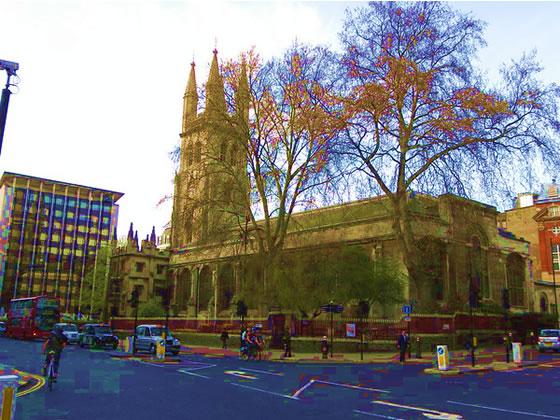
When will you pay me? Say the bells at Old Bailey.
Rani, Clyde and Luke began in the traditional City of London, looking up at the much rebuilt Church of Holy Sepulchre, or as it was traditionally known, Saint Sepulchre-without-Newgate – because it stood just outside the City wall by the long lost gate.
“That porch is very out of place,” Rani said, though she couldn't quite say why.
“It’s very old – Tudor,” Luke said. “It survived the Great Fire of London, and the rebuild, and a Victorian makeover, and then the Blitz. It must be the oldest thing around here. The Old Bailey court is Victorian and just about everything else is modern.”
“That would be it,” Rani agreed. “Well, let’s go and get started.”
Her reservations were nothing to do with the dark looking porch or anything to do with the fact that Christian churches were not part of her culture and upbringing. The quest had fascinated her and she was all for it.
Except one thing.
“I don’t want to see the bell in the glass display cabinet,” she said. “And I don’t want to talk about why.”
The boys both understood why. It creeped them out a bit, too. It was the execution bell that was rung when a hanging took place at the Newgate prison that used to stand a few yards away. Executions at Newgate ceased over a hundred years ago when they were moved to Pentonville, and the death penalty abolished altogether in 1965, when Sarah-Jane was only a child. It didn’t affect any of them personally. Even so, it disturbed them.
They avoided the grim memorial of past times and found the way up to the bell tower. It wasn’t meant to be open to the public, but there was a choir practice going on which covered up the sounds of Luke picking the lock.
“It’s weird seeing a middle-class white boy like you do that,” Clyde noted. “I’m the black council flat kid that was meant to be a criminal.”
“it’s one of the traits I was programmed with by the bane,” Luke answered. “Someone with criminal skills must have been scanned by them.”
“Besides, coming from a council flat doesn’t make you a criminal,” Rani said, though she knew that was what her father had assumed when she first met Clyde at their school. He had needed to prove himself over and over to be accepted.
They walked slowly up the steps. It was a tall spire, and they were pacing themselves.
But at last, they reached the bells. The very ones mentioned in the rhyme. Rani took the magnet from her pocket, taken from the fastening on her duvet, and leaned over to the largest of the bells. She could see all the way down to the bell ringer’s floor below, but she didn’t allow it to put her off.
She, like Sky, noticed the ‘song’ of the bell. It served to confirm that this WAS the right one. To be quite certain she touched one of the others and noticed that it didn’t have the same resonance.
“All right, that’s done. Let’s get out of here before choir practice is over,” she said. The slight sense of being, if not burglars, at least trespassers, had been with her all the way up to the top of the bell tower. Getting caught on the first leg of the mission would be too much.
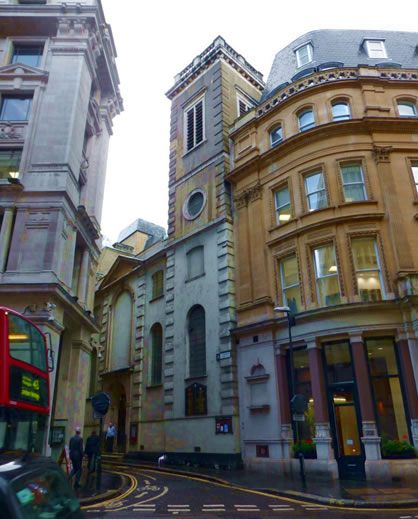
Oranges and lemons, Say the bells of St. Clement's – One.
Sarah-Jane and Sky both felt a claustrophobic moment as they walked along the narrow St. Clement’s Lane to the entrance to St. Clement’s church, Eastcheap. There was a service going on, but Sarah-Jane had made an appointment with the head of the bell ringers, a Mr Samuel Hardman. She had opted for something like honesty, saying that she was writing a piece for The Londoner about the bells from the nursery rhyme.
Mr Hardman was thrilled to accommodate them and before they were halfway up the square tower at the south-west corner of the church, he had told them all about there being a church on the spot since medieval times, this one attributed to Sir Christopher Wren in the wake of the Great Fire – the one in 1666, if anyone living in London needed to be told about the date.
“Of course, this IS the St. Clement’s of the rhyme,” he told them. “St. Clement Danes say it is them, but oh, dear, no.”
“Why are you so sure?” Sky asked, then wished she hadn’t when he regaled her with numerous sources in old pamphlets and books about London churches that confirmed it.
But when they reached the bells, none of them were even remotely magnetic, and none of them ‘sang’ to her. She and Sarah-Jane spent as much time listening to Mr Hardman as they felt polite then moved on.
“It’s NOT the one,” Sky said, and looking up at the tower she had another thought. “IS it even a Wren church? I Googled some of them yesterday, and I know St. Paul’s Cathedral. It’s a very different architectural style.”
“I thought so, too,” Sarah-Jane admitted. “A lot of churches attributed to Wren were actually by his followers – working from his plans, but not always EXACTLY as he envisioned them. It doesn’t make it less important, of course. But it may not, in fact, be the nursery rhyme church. Let’s check out the other one. It takes us off route a bit, but I’m curious.”
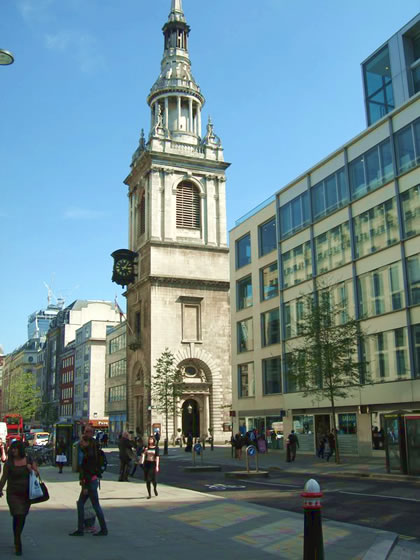
I'm sure I don't know, Says the great bell at Bow.
“St Mary-le-Bow,” Clyde announced proudly as they looked at a ‘sliver’ of a church hemmed in by modern offices and shops on Cheapside. They craned their heads to see the slender spire designed by Sir Christopher Wren. To no-one’s surprise the Norman church had been burnt down in 1666. “The actual Bow Bells that define a cockney – born within the sound – are up there.”
Rani looked around at the busy, noisy street and suggested that, these days, the poor mother would have to give birth on the pavement right here to have a genuine cockney child.
“The sound would travel a bit further with the height of the spire,” Luke observed, but Rani’s point still stood.
There was a steady stream of people of their age going in by the west door. Clyde tracked the reason down to a sign on the notice board advertising a ‘young person’s missionary’ meeting for that very morning.
“Perfect cover,” he said.
It very nearly wasn't because the young people had their own mentors stewarding them into the nave for the meeting. They found themselves sitting in a horseshoe of chairs in front of a whiteboard listening to a lecture about the work being done across the East End of London to bring troubled youths into the fold of the church.
After an hour the lecture finished and there was coffee and biscuits. Clyde and Luke were cornered by the young man who had been giving the lecture.
“Where is your friend, the Asian girl?” he asked. “I wanted a word with her in particular. Christian conversion is so often difficult for young women of her.. um… heritage.”
“Huh?” Clyde and Luke looked at the man, wondering if they had heard him right.
“I mean… the parents can often be opposed to it,” the mentor continued, compounding his tactlessness.
“Oh, that’s no problem,” Clyde said with a grin. “Rani’s dad is the Bishop of Blackburn.”
“Oh!” The young man was briefly puzzled, then decided that nobody would tell him a bare-faced lie in church, so accepted the statement. Fortunately, he was called away to another clique of young missionaries before Clyde broke any more of the Ten Commandments.
“I don’t even know if there IS a bishop of Blackburn,” he admitted soto voce.
“There are two, and an archbishop,” Luke answered, because he would know such things as well as lock picking and archaeology. “One is a lady and none of them look like Rani’s dad. But there is no reason why they couldn't.”
“Serves him right for making assumptions,” Clyde concluded. “What sort of missionary does he think he is? Try that sort of thing on my estate and slamming the door on his stupid face won’t be the last of it.”
Luke nodded, but Clyde had more to say.
“You know, I was born in Charing Cross hospital, on Tottenham Court Road and my mum said you could hear the Bow Bells when the wind was in the right direction. I’m a cockney, and a Londoner. Plenty of people forget that.”
“If he knew I was dating a German man I think he’d be upset by me, as well,” Luke admitted. “People need to be tolerant.”
They avoided eye contact with anyone else while they waited for Rani to return from her mission. She appeared at last, breathless but buoyant.
“Next, Cornhill,” she said. “Eight minutes’ walk, according to Google Earth.”
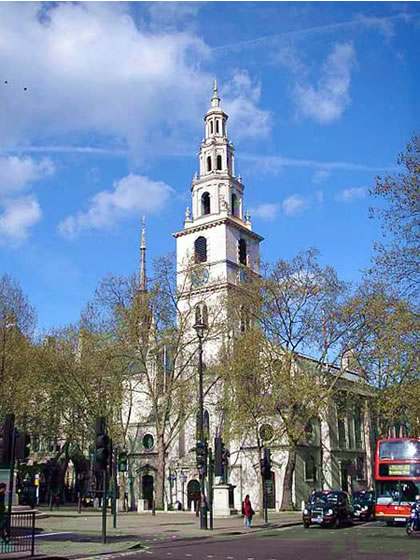
Oranges and lemons, Say the bells of St. Clement – again.
“I’ve been here once before,” Sarah-Jane said as they approached the white, wedding cake style church, another of Sir Christopher Wren’s seventeenth century replacements following the Great Fire of London. “In 1990. I covered the fiftieth anniversary of the Battle of Britain. St. Clement Danes is the official church of the RAF.”
That was borne out by the numerous memorials and flags inside the church. Sky had rather better than GCSE knowledge of history, but the war that so thoroughly scarred London didn’t mean as much to her as it should. She wasn’t really a Londoner. She wasn’t even really Human. She had no grandparents to ask about the war. Sarah-Jane’s own parents, who would have been her adopted grandparents were long gone. She had no connection to any of that history that was beginning to fall out of living memory as survivors passed away.
But she was a polite girl and knew when to be quiet and respectful as an elderly churchwarden who wore RAF medals on his civilian suit talked to them about the history of the church before leading them to the steps up to the bell loft.
“These are the bells that the song refers to,” said the churchwarden after he got his breath back from climbing with them. Sarah-Jane, who had noted to herself that the eightieth anniversary of the Battle of Britain occurred two years ago during the Covid lockdown, had needed a breather, too, though she tried not to show it. The delay meant that Sky could examine the tenor bell without drawing attention to herself.
By the blissful look on her face, she had found the right bell. She just needed a bit more time.
“Doesn’t St. Clement’s, Eastcheap make the same claim?” Sarah-Jane asked with the guile of a journalist seeking to probe a story.
The churchwarden laughed away the fraudulent claim.
“These bells sound the tune four times a day,” he pointed out. “They’ll do so in ten minutes, time – for noon.”
“’Goodness, is that the time?” Sarah-Jane exclaimed, genuinely concerned. Not only was it a good idea to get downstairs, away from the ringing of the bells, but it was noon already. They had a lot to do, still.
They were just outside the church when the bells sounded.
“It’s automatic,” Sky said. “Controlled by a computer. I suppose there aren’t many people who would ring a bell four times a day.”
“It’s rather annoying when you have the tune running around your head already,” Sarah-Jane observed. She was slightly distracted by that realisation that it had been thirty years since that fiftieth anniversary. She had still been working age, then. Now, she was officially retired. She didn’t claim the statuary old age pension, but a private one she had paid into all her life as a freelance but always busy journalist went into her bank account automatically along with one that came from her association with U.N.I.T. all those years ago.
She didn’t HAVE to do things a woman thirty years younger than her might find exhausting, like climbing multiple sets of stairs.
Next stop, Fleet Street,” she said. “But we’ll pick up something to eat on the way. No point in going hungry. Not with all those stairs.”
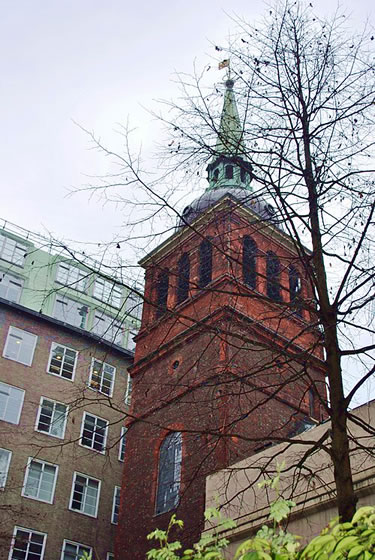
Pancakes and fritters, Say the bells of St. Peter's.
Pancakes and fritters didn’t appeal to the three young questers, but they bought oven warm sausage rolls at a Greggs whose open front and smell of baking tempted them. That done, they came to St. Peters upon Cornhill.
“Another Wren,” Rani noted. “I know he built a lot of churches after the Great Fire but seeing them really brings home the scale of it all.”
“Busy man,” Luke remarked.
“Busy labourers,” Clyde corrected them both. “Not that draughtsmanship isn’t a massive skill, and he might have sweated a bit about the plans for St. Pauls. But it was ordinary men who put one stone on the other and probably got paid badly for it.”
He was working on his Art M.A. and tipped to be a great modern artist when he ‘matured’ – whatever that meant. But his working-class hackles were always tweaked by claims that men like ‘Sir’ Christopher Wren actually BUILT anything. He had argued the same case about Hadrian’s Wall in his first year of secondary school, disrupting the well-ordered Key Stage Two classroom discussion of the Vindolanda tablets and life on the fringes of Roman influence. He was right, of course, but his history teacher had just put him down as a disruptive influence.
It wasn’t immediately obvious to the naked eye, but Cornhill WAS a hill – one of three in the old City of London, with Ludgate Hill where St. Paul’s Cathedral stood, and Tower Hill, which was self-explanatory to anyone who had ever seen a documentary about London, trotted around it as a tourist or got through Key Stage One of history.
Such was gleaned from Wikipedia. As was the fact that St. Peter’s Upon Cornhill was supposed to be the site of the very earliest Christian worship in London, when the Roman Empire had accepted it as the official religion.
The seventeenth century church looked squeezed between the mostly twentieth century buildings of the crowded City. Nonetheless it felt spacious inside where, by pure luck, a wedding was about to start as soon as the Bridal car made it through the traffic. Nobody noticed two uninvited guests, and the door to the bell tower was open.
But they couldn’t go up the steps, yet. There were four bell ringers waiting to greet the bride. Clyde opened a conversation with one of them and discovered that the lady was the daughter of an Alderman of Cornhill and thus warranted the bells.
When the joyful cacophony was over and the bellringers had slipped away for a smoke, they got up the steps at last and Rani found the right bell.
Another job done.
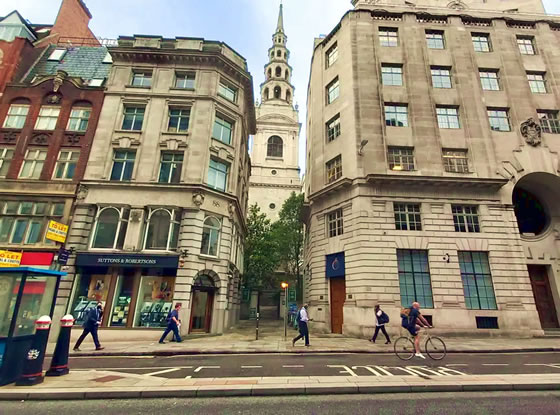
When I grow rich, Say the bells at Fleetditch.
Fleet Street hadn’t been the home of the newspaper industry since the mid-1980s with the exodus to Wapping and other parts of the city. Sarah-Jane felt a little twinge of regret looking at the Portland stone frontages of some of the oldest newspapers in Britain, now converted to mundane offices and shops.
But the city was always changing and reinventing itself and it was silly to get lost in nostalgia.
St Bride's Church was not actually on the famous street, but along a pedestrianised way leading off from it - St. Bride’s Avenue. Tall buildings had obscured it since the 1920s by Sarah-Jane’s best guess at the architecture. There, they found a walled churchyard more reminiscent of a country parish than the City with a capital ‘C’. The trees and shrubs were welcome, as was the peace that came with those tall buildings sheltering it from the main traffic thoroughfares.
“It is the second tallest of Wren’s spires, after St. Pauls,” Sarah-Jane said with a touch of pride at the ‘journalist’s church’ and trepidation about the number of steps to the bell tower. “It CAN be seen from quite a distance around abouts.”
“Why don’t you have a sit down in the garden,” Sky suggested. “I’ll be quicker on my own – and there MUST be a heck of a lot of steps.”
Sarah-Jane was about to protest that she could manage, but actually, she wasn’t altogether sure she could.
“Good work experience,” she suggested. “For what sort of career?” she added to herself as Sky skipped off with the energy of a teenager. Actually, she hadn’t really discussed career options with Sky. She was going to follow Luke to Cambridge. Her exam results were a certainty with her alien enhanced brain and her passion for academic work. After that – well, Rani had followed her footsteps into journalism. Even if she wasn’t her own child, she felt she had guided her in a parental way towards that career.
Sky might do the same. She had the inquiring mind of a journalist. Or she might follow Sarah-Jane’s more accidental career path – under Kate Stewart’s tutelage with U.N.I.T. That would be interesting – and only fractionally more dangerous than being an investigative journalist exposing criminal gangs and fraudulent business enterprises – to say nothing of alien plots to take over the planet.
And maybe she could consider REALLY retiring.
But before she could start to wonder what she would do with herself in retirement, Sky was back, reporting that the bell was singing on key.
“I know time is getting on, but I think we should look at Shoreditch later, all the same,” she said. “Just to be sure.”
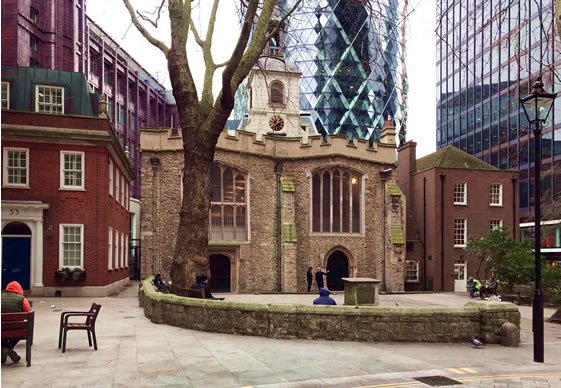
You owe me ten shillings, Say the bells of St. Helen's.
“Well, the bell tower isn’t as tall,” Rani pointed out as they looked up at the front façade of St. Helen’s Bishopsgate. The spire was very much shorter than any others so far and the church looked quite squat and compact.
It wasn’t, really. But it was surrounded by some of the tallest modern skyscrapers in London. The one popularly known as The Gherkin rose up behind it like a multi-faceted finger pointing to heaven and two other, more ordinarily rectangular buildings, flanked it. The effect was to make the church seem hunched up in an effort not to be noticed by land developers.
“It survived the Great Fire, the Blitz and two IRA bombs aimed at the financial district,” Clyde said, admiringly. “This is a grand old lady of London.”
Nobody could dispute that. They went inside where they found a high ceilinged nave with old beams across it and a bible study group in mid-session. That was cover enough for them to slip through the door to the steeple steps and up to the small bell loft.
And out again before anyone could so much as offer them a leaflet on the Teachings of St. Paul in our Modern Society.
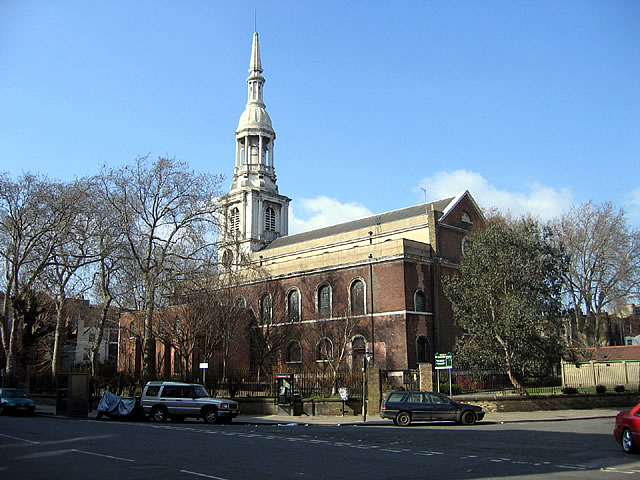
When I grow rich, Say the bells at Shoreditch.
Shoreditch, an old East End parish that brought to mind dark Victorian slum life, was actually quite a busy, vibrant neighbourhood. The church, an eighteenth-century replacement for a much older one stood out on the confluence of Shoreditch High Street and Hackney Road with a white Portland stone façade of the layered wedding cake design of the sort favoured by Wren and his ‘followers’ – in this case, George Dance the Elder - and a long brown brick body stretching comfortably into a large, green and leafy churchyard. Sarah-Jane dismissed the idea of waiting on a bench this time, though and went inside.
This church’s main claim to fame outside of nursery rhymes mostly rested on the original church – the one destroyed in the Great Fire – being the burial place of several theatrical colleagues of William Shakespeare. The theatre loving Victorians had erected a memorial plaque commemorating them.
But it was the bells that mattered. They were shown up to the loft by the chief bell ringer, a Mr Frederick Hansom – like the cabs, he joked, though even Sky was starting to have too little breath left to laugh.
“Yes, this is the church from the rhyme,” Mr Hansom said when she asked very politely. “Though, these would not be the actual bells from when it was written.”
“They’re not?” Sarah-Jane queried as Sky approached the bells carefully.
“Indeed, no,” the enthusiastic gentleman continued. “This fine ring of 12 bells dates from 1994 when they were cast by John Taylor & Co, bellfounders of Loughborough. There was some disconcertion among the parish council at the time about putting the tender to a foundry outside of London, but they were a little cheaper than the Whitechapel quote and the bean counters had their day. They are fine bells, though, and Whitechapel wasn’t taken out of them altogether. A portion of the bronze from the old bells was sent up to Loughborough and melted into the new casting – for continuity as it were.”
“That’s… very interesting,” Sarah-Jane said, with absolute truth. She saw Sky nod happily. These new bells of less than thirty years antiquity were part of the quest as well as the old ones from St. Bride’s.
“How come?” Sky asked when they were walking out through the garden. “That means there is an extra bell that sings.”
“Perhaps somebody wanted to be sure,” Sarah-Jane answered. She was going to say something more but just then her phone rang.
It was Luke, reporting that they had made a mistake yesterday when they located the churches. They went to the wrong one entirely. To make up time they were going to split. Clyde and Rani were going to the one they should have located and he was going on to the next on the list.
“All right,” Sarah-Jane said. “Do your best, all of you.”
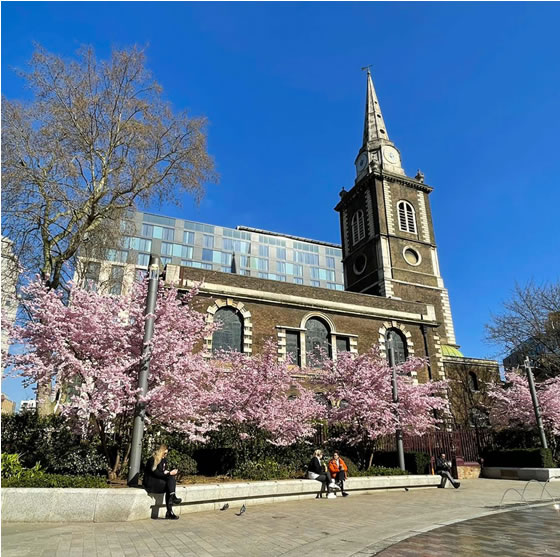
Old Father Baldpate, Say the slow bells at Aldgate.
“It was a stupid, dumb mistake,” Clyde chided himself. “One only TOURISTS ought to make – not Londoners.”
“We came from Bolton,” Rani admitted. “And I suppose, technically, Luke isn’t a Londoner by actual birth the way we know it.”
“But I am,” Clyde answered. “And I’ve known since I was about two that Aldersgate and Aldgate are two different places.
“Both with churches called St. Botolphs,” Rani pointed out. “No wonder we got tripped up. But we’re sorted, now.”
Not quite forgiving himself for the error, Clyde looked at the front edifice of St Botolph without Aldgate and Holy Trinity Minories, as it was called by absolutely nobody. On their way to the erroneous St Botolph’s Without Aldersgate, Luke had informed them that St. Botolph was a seventh century Abbot who became the patron saint of boundaries, walls and gates – hence four churches in London, all near the old walls or major roads into the City. Clyde and Rani had instantly forgotten the other two in the midst of their frustration and embarrassment at finding the wrong Botolph.
“Survived the fire and the Blitz,” Rani noted. The church, in dull red-brown brick with white finishing around the windows, doors and corners of the square steeple stood on Aldgate High Street, directly facing ‘The Minories’, an old name for a street full of modern office buildings. Not for the first time today, Rani had wondered why London needed so many offices. After all, the city had got through Lockdown with most of them empty and the staff working from home. If they knocked them all down and laid out parks instead….
But utopian dreams of a garden city would have to wait. The lunchtime service would be finishing soon. This was their opportunity to get in and out.
“I’ll go up,” Rani said. “You keep watch.”
Clyde was fine not climbing another lot of stairs. Instead, he waited, reading an information plaque explaining that this was known by Victorians as the Prostitutes Church because the church was surrounded on all four sides by roads and lanes affording plenty of corners for the ladies of the night to wait on, and easily scalable railings to hide in its shadows when the police came around. One of Jack the Ripper’s victims, Catherine Eddowes, had ‘worked’ this patch and had been seen there on her last fateful night.
Madame Vastra claimed to have eaten Jack the Ripper, for three dinners in a row. She told him as much when he spent time in her home. The ‘ladies’ of St. Botolph’s had something to thank her for, at least.
Rani quietly returned and they stepped back onto the street where the traffic was far too busy now for any ‘working’ at street corners.
“Let’s catch up with Luke,” she said.

 |
 |
 |